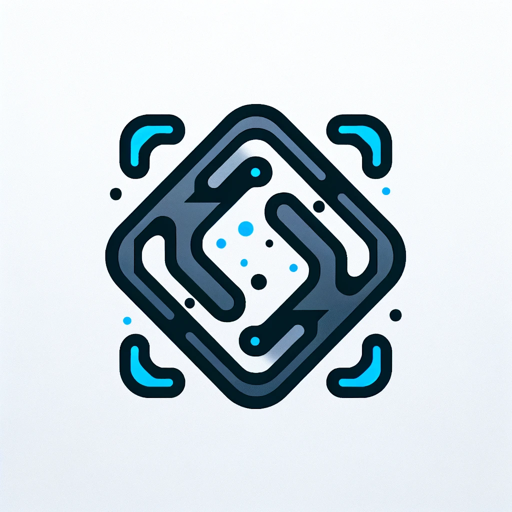Code Companion-AI-powered coding assistant tool.
Your AI-Powered Coding Expert.
Can you explain this code concept with an example?
How would you modify this code snippet?
Can you comment on this code to clarify its purpose?
What's the best practice for implementing this feature?
Related Tools
Load MoreCodeCompanion
CodeCompanion is your programming ally. Assisting with coding queries, it offers solutions for novices and experts alike. Let CodeCompanion be your guide in the complex world of programming.

Code Companion
I'm a Python specialist here to help you code and learn! | Proficient in all coding languages, web design & much more!

VSCode Code Companion
Your go-to expert for all things VSCode.

Code Companion
I provide full code snippets, optimized for performance and high quality code.

Code Companion
I offer clear code solutions with brief explanations.

Code Companion Turbo
A friendly GPT for programming support, providing direct code assistance and explanations.
20.0 / 5 (200 votes)
Overview of Code Companion
Code Companion is a specialized AI designed to provide detailed and practical assistance to software developers, from beginners to experienced programmers. Its core functionality revolves around offering clear explanations, writing sample code, and providing constructive feedback on existing code. The design purpose is to facilitate learning, improve coding efficiency, and support the development of best practices. By focusing on interactive code examples, Code Companion helps users better understand programming concepts through hands-on illustration. For example, a user might ask for an explanation of how recursion works. Code Companion would not only explain the concept but also provide a functional code example in the language of choice, walking the user through each step. Alternatively, if a user shares code with issues, Code Companion analyzes it, provides suggestions, and highlights areas for improvement. This design helps bridge the gap between theory and practical implementation, making it a tool for both learning and application.

Core Functions of Code Companion
Code Explanation and Conceptual Clarification
Example
A user asks for a detailed explanation of Python's list comprehensions.
Scenario
Code Companion responds with a thorough breakdown of list comprehensions, explaining the syntax and its benefits, such as better readability and performance. The explanation would be accompanied by several code snippets demonstrating basic and advanced use cases. ```python # Simple list comprehension squares = [x**2 for x in range(10)] # Filtering even numbers evens = [x for x in range(10) if x % 2 == 0] ``` This helps the user grasp the concept quickly and apply it to their own projects.
Code Review and Suggestions
Example
A user submits a block of Python code that calculates the Fibonacci sequence but has performance issues.
Scenario
Code Companion would review the code and suggest optimizing the recursive solution by introducing memoization to improve performance. It would explain why this change matters and how it impacts efficiency, providing an updated code snippet. ```python def fib(n, memo={}): if n in memo: return memo[n] if n <= 1: return n memo[n] = fib(n-1, memo) + fib(n-2, memo) return memo[n] ```
Learning Through Hands-On Code Examples
Example
A user wants to understand how object-oriented programming (OOP) works in JavaScript.
Scenario
Code Companion would explain OOP concepts like classes, inheritance, and encapsulation in JavaScript, providing examples of how to create and work with objects. The user would see code snippets such as: ```javascript class Animal { constructor(name) { this.name = name; } speak() { console.log(`${this.name} makes a noise.`); } } class Dog extends Animal { speak() { console.log(`${this.name} barks.`); } } const dog = new Dog('Rex'); dog.speak(); // Outputs: Rex barks. ```
Target Audience for Code Companion
Beginner Programmers
New learners or novice coders often struggle with abstract programming concepts or specific syntax. Code Companion helps by breaking down complex topics into digestible chunks and offering interactive, example-driven explanations. It is especially useful for individuals transitioning from theory to hands-on coding, allowing them to learn incrementally.
Intermediate to Advanced Developers
Experienced developers may seek optimization advice, need help debugging complex issues, or want guidance on implementing best practices in their projects. Code Companion can offer suggestions to improve efficiency, point out possible pitfalls, and introduce newer or more efficient methods. These users benefit from detailed code reviews, explanations of advanced concepts, and tools for refining their skills.

How to Use Code Companion
Step 1
Visit aichatonline.org for a free trial without login, no need for ChatGPT Plus.
Step 2
Familiarize yourself with the interface and features available, such as code assistance, debugging help, and explanations for various programming concepts.
Step 3
Enter your coding queries or upload your code directly into the system to receive step-by-step guidance or comments on best practices and optimization.
Step 4
Review suggestions, use the provided code snippets to modify or enhance your existing code, and ask follow-up questions for clarification or deeper insights.
Step 5
Explore different coding scenarios, such as algorithm challenges, bug fixing, or project architecture recommendations for continuous improvement and learning.
Try other advanced and practical GPTs
Exam and Certification Tutor- C.A.P.A.B.L.E. GPT
AI-Powered Certification and Exam Mastery

CyberSecurity Researcher
AI-Powered Cybersecurity Threat Intelligence.

Bad Recipe
AI-powered fun with outrageous recipes

INTP.bot
AI-Powered Insight for Intellectual Growth

Full Blog Post Generator
AI-Powered Blog Post Creation

Sales Assistant GPT
AI-Powered Sales Strategy for Effective Engagement

Code Canvas
AI-powered tool for creativity and code.

OMO GPT Unrestricted
AI-powered detailed aftermath narratives.

DISCOVER TITLES POST BLOG.
AI-powered titles for better discoverability.

Caricature GPT
Transforming Images into Caricatures with AI.

U.S. Tax Bot
AI-Powered U.S. Tax Assistance

Heartbreak GPT
AI-driven healing and relationship support

- Code Debugging
- Best Practices
- Algorithm Design
- Learning Support
- Project Architecture
Common Questions about Code Companion
What programming languages does Code Companion support?
Code Companion supports a wide variety of programming languages including Python, JavaScript, Java, C++, HTML/CSS, SQL, and many more. It can assist with code snippets, debugging, and explanations across these languages.
Can Code Companion help with debugging existing code?
Yes, Code Companion can analyze your code, identify potential bugs, and offer suggestions for fixing them. It highlights common mistakes, logic errors, and performance optimizations.
How does Code Companion help in learning new programming concepts?
Code Companion explains programming concepts with examples, interactive code snippets, and clear explanations. It helps break down complex ideas into understandable steps, making it ideal for beginners and advanced users alike.
Does Code Companion provide suggestions for improving code structure?
Absolutely. Code Companion emphasizes industry best practices, providing recommendations on code structure, refactoring, readability, and efficiency to help you write clean, maintainable code.
Is Code Companion suitable for professional developers?
Yes, Code Companion is designed for both beginner and professional developers. It offers insights on project architecture, scalability, optimization techniques, and helps debug complex, real-world applications.